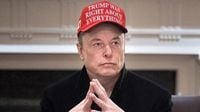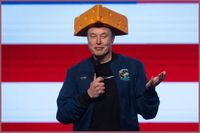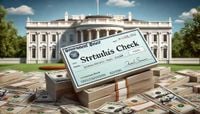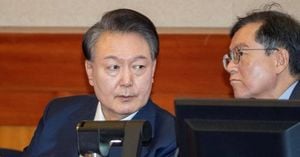GREEN BAY, Wis. (TNND) — Elon Musk, the head of the Department of Government Efficiency (DOGE), hosted a town hall meeting on March 30, 2025, in Wisconsin, where he addressed numerous questions about his role, the future of DOGE, and the controversial topic of potential stimulus checks for taxpayers. The event coincided with a crucial state Supreme Court election, which could determine the balance of power in the state.
Musk's comments during the town hall centered on his vision for a smaller government, a topic he passionately supports. He referenced the original Cabinet of the United States, led by George Washington in the late 1700s, stating, "When the United States was formed, there were only, um – you know, you had the secretary of state, the secretary of war, which I think is a more accurate name than ‘defense,’ um, uh, and, you know, but it was secretary of war for a long time. Um, and you had secretary of the treasury, and you had the attorney general. That was it. And, um, if it were entirely up to me, I’d be like, ‘let’s – let’s make it like that again.’”
In addition to advocating for a smaller government, Musk also expressed his support for terminating the Federal Reserve, questioning the need for its current staffing levels. "In fact, there’s a lot of people who work at the Fed, and I was thinking, like, ‘why do we have so many people at this – at the Fed and what do they do?” he remarked. He humorously suggested that a Magic 8 Ball might perform just as well as the Federal Reserve Board in determining interest rates.
During the town hall, Musk was asked about the possibility of taxpayers receiving checks based on the savings DOGE claims to be generating. He responded that any decision regarding such checks would ultimately depend on President Donald Trump and Congress. "It’s somewhat up to Congress and maybe the president to, you know, as to whether specific checks are cut," Musk explained. He emphasized that while his department aims to make government spending more efficient, the distribution of any potential stimulus checks remains uncertain.
The idea of DOGE stimulus checks gained traction after investment firm CEO James Fishback proposed the concept on social media in February 2025, suggesting that savings from DOGE could be returned to taxpayers. President Trump has since indicated that he and his advisors are discussing allocating 20% of DOGE's savings towards taxpayer relief and another 20% to reduce the national debt.
Despite the excitement surrounding the potential for stimulus checks, many economists have voiced skepticism about the idea. Judge Glock, director of research at the Manhattan Institute, warned that issuing such checks could increase the deficit and have inflationary consequences, stating, "It would increase the deficit, it would increase immediate consumer spending, and that would have inflationary consequences, which is something we don't want right now.”
At the town hall, Musk also handed out two checks worth $1 million each to attendees, which he described as a gesture of appreciation for their efforts in opposing what he called "activist judges." This act has raised eyebrows, with critics questioning whether it violates campaign finance laws, as the funds were reportedly drawn from Musk's private resources.
In the aftermath of the town hall, a clip of Musk's responses regarding the stimulus checks went viral, with social media users mocking his ambiguous answers. One user quipped, "Santa Claus and the tooth fairy will bring the checks," while another stated, "There is no money coming home! Hope that helps 💙" This backlash highlighted the uncertainty surrounding DOGE's claims and the feasibility of its proposals.
As the debate over stimulus checks continues, the role of Congress and the president remains pivotal. Musk reiterated that the fate of any proposed checks lies in their hands, stating, "But whether checks are cut or not, if you reduce wasteful spending, the economy is going to be better off.”
In the broader context, DOGE was established as a federal initiative aimed at cutting government waste and modernizing outdated systems. Since its inception, the agency claims to have saved $130 billion, with a goal of achieving $2 trillion in total savings. However, the agency's actions have not been without controversy; it has faced backlash over its staffing decisions, including the firing of thousands of federal employees and the subsequent rescinding of some layoffs.
As the public awaits further developments, the uncertainty surrounding the DOGE stimulus checks reflects a broader conversation about fiscal responsibility and government efficiency. Speaker of the House Mike Johnson has expressed concerns about the proposal, emphasizing the need to prioritize reducing the national debt, which currently stands at $36 trillion. “We need to pay down the credit card,” he stated, underscoring the tension between immediate relief and long-term fiscal health.
In conclusion, while the idea of DOGE stimulus checks may be appealing to some, the path to realization is fraught with political and economic challenges. With Congress and the president holding the reins, the future of these potential payments remains unclear, leaving many Americans in a state of anticipation.








